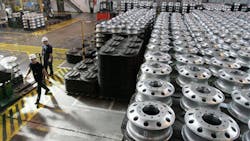Alcoa Aims to Break Metal Shackles as Earnings Sink
Alcoa Inc. has an identity problem, and it’s something CEO Klaus Kleinfeld is hoping to finally fix.
For years, the company tried to persuade investors to value it more for its engineering prowess than its exposure to a global metal glut. After all, it now gets more revenue from car, airplane and building parts than from primary aluminum. The stock, though, still trades more like a miner than a manufacturer, losing 31% over the past 12 months.
In September, Kleinfeld said he’d split the company, separating units that make metal products from those that make the metal itself. With the release of earnings results today, investors will be watching for evidence Alcoa can boost sales enough in the downstream parts business to offset the falling metal price. The stakes are high. Alcoa has spent billions in acquisitions to fortify its automotive and aerospace offerings while greatly reducing its capacity to make aluminum.
“The key of what the valuation is really depends on the downstream,” David Lipschitz, a New York-based analyst at CLSA Americas LLC, said by phone on Thursday. “So that’s the big question.”
The stock’s slump in the past year is in line with the Bloomberg World Mining Index, as the price of the lightweight metal fell 14%. A gauge of manufacturing companies was little changed in the same span. The correlation between Alcoa shares and aluminum prices is the highest in more than three years, according to data compiled by Bloomberg.
Alcoa spokeswoman Monica Orbe declined to comment on the company’s performance before the earnings were announced.
“Alcoa has been such an enigma for a long time,” Anthony Young, an analyst at Macquarie Group Ltd., said by telephone Friday. Kleinfeld “gets credit for being a good CEO, but that’s not reflected in the share price.”
That stickiness helps explain Kleinfeld’s separation plan. Now investors are wondering if he can deliver on targets in those segments that form the metal into products for carmakers, food and drink packages, airplanes and buildings.
In the first quarter, Alcoa’s earnings excluding one-time items slumped more than 90% from a year ago to 2 cents a share, according to the average estimate among analysts tracked by Bloomberg. The release, after the close of regular trading, will be followed by a conference call with analysts at 5 p.m. EDT.
The two independent companies are scheduled to be formed in the second half of the year. By July, Alcoa will release information on the two companies’ capital structures and how assets and liabilities will be allocated.
While China’s slowing demand and rising supply of aluminum have weighed on Alcoa’s upstream business, growth in its downstream operations has also been disappointing, according to Curt Woodworth, a New York-based analyst at Credit Suisse Group AG.
In January, Alcoa forecast that the three downstream segments could show as little as zero growth in the first quarter.
“They’ve rationalized this huge amount of smelters and refineries,” Woodworth said in an interview Friday. “People are trying to figure out what that means for cash costs. Can you lower the breakeven enough so the upstream can really live on its own in a split?”
By Sonja Elmquist
About the Author
Bloomberg
Licensed content from Bloomberg, copyright 2016.
